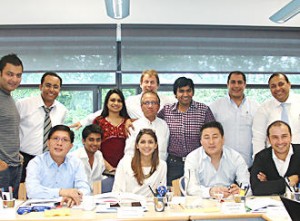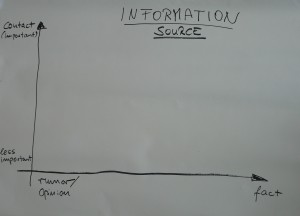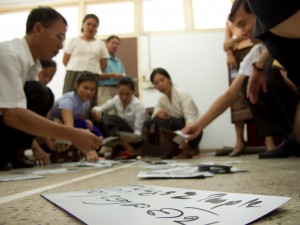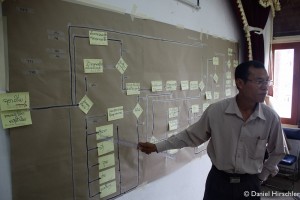Search Results for Tag: workshops
Creating confidence in the classroom
Active acquisition of knowledge to solve concrete challenges creates confidence. And that’s something you need when you have to teach journalism to a classroom full of young Laotian twentysomethings, as do the instructors at the National University of Laos (NUOL).
These instructors are currently students themselves: they’re taking part in journalism teachers’ training and coaching, which is organized in partnership with DW-AKADEMIE’s Asia team.
At a workshop in December we reviewed some of the progress made so far. “I have more confidence in teaching these subjects now,” said one of the younger colleagues. Others agreed.
One senior lecturer brought along a revamped version of a project the training participants had created the previous September – a newspaper made from scratch. It was a showcase item at NUOL’s 15th anniversary celebration in November.
The instructors-in-training had put tremendous effort into producing it, and that has really paid off in their daily work. Here’s why:
![]() read more
read more
Asian media execs brush up their leadership skills in Bonn
 “Change management” was the catchphrase for 13 media managers from eight North African and Asian countries who attended a management training workshop in Bonn this summer. The participants discussed ways to organize transition at their respective stations. By using techniques like role play, they practiced communicating their decisions in a professional way. The training also highlighted cooperation and conflict in teams, group dynamics and key aspects of human resource development.
“Change management” was the catchphrase for 13 media managers from eight North African and Asian countries who attended a management training workshop in Bonn this summer. The participants discussed ways to organize transition at their respective stations. By using techniques like role play, they practiced communicating their decisions in a professional way. The training also highlighted cooperation and conflict in teams, group dynamics and key aspects of human resource development.
The Asian participants came from Bangladesh, Pakistan, Philippines and Mongolia. Besides visiting DW’s facilities and attending the Deutsche Welle Global Media conference ahead of the workshop, their action-packed schedule included a visit to German public broadcaster WDR in Cologne. A lively exchange with that station’s director of human resources topped off the week.
In this video, project manager Patrick Benning takes us inside the week-long workshop that was taught by DW-AKADEMIE trainer Achim Toennes. Participants Sarmad Palijo of Pakistan and Mat Verano Pareja of the Philippines describe their impressions of the visit to Germany.
Using an “axis of importance” diagram to evaluate sources
 Out of one workshop at NUOL came a good tool that fits perfectly into that quest. It’s a diagram that helps journalists evaluate their sources (see photo at left, click to enlarge).
Out of one workshop at NUOL came a good tool that fits perfectly into that quest. It’s a diagram that helps journalists evaluate their sources (see photo at left, click to enlarge).![]() read more
read more
An inside look at Bhutan’s first TV program for kids
Thinley Yangchen Dorji, a producer at the Bhutan Broadcasting Service Corporation (BBS), takes us on a tour behind the scenes of Bhutan’s first homegrown TV show for kids. Called “My World”, it’s a 30-minute program for youngsters aged eight to twelve that began airing regularly in January. Welcome to “My World”!
Prior to “My World” there were no Bhutanese television programs for children. Foreign programming available via satellite was entertaining but had little educational value. Pema Choden, BBS’s General Director until the end of March 2011, approached DW-AKADEMIE for support. Her aim was to have a quality program tailored to children in Bhutan.
![]() read more
read more
Educators embark into a new era of journalism in Laos
 Is there a proper definition of journalism in the Lao language? Since DW-AKADEMIE’s first workshop on journalism at the National University of Laos in Vientiane, there is. It was conceived by 15 staff teachers of the Department of Mass Communication at the Faculty of Letters – after long discussions revolving around somewhat abstract terms like “media”, “the public”, “society” and “information”.
Is there a proper definition of journalism in the Lao language? Since DW-AKADEMIE’s first workshop on journalism at the National University of Laos in Vientiane, there is. It was conceived by 15 staff teachers of the Department of Mass Communication at the Faculty of Letters – after long discussions revolving around somewhat abstract terms like “media”, “the public”, “society” and “information”.
Lao is not a language that lends itself to describing abstract ideas. Yet the 15 teachers feel it was worth the effort to lay a foundation they now can build upon. They are learning the mindset, tools and skills that in combination make a journalist. The reasoning behind this is that they are the ones training a new generation of Lao students who are eager to take on the profession.
![]() read more
read more








